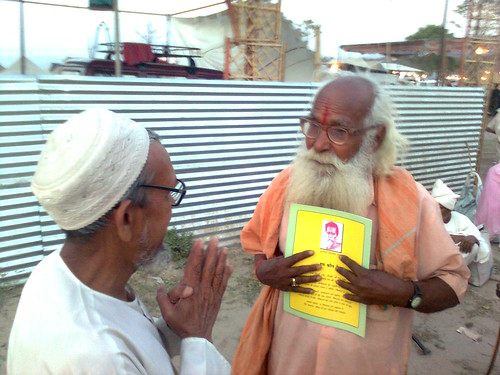By Asit Srivastava, IANS,
Lucknow : You could hardly have guessed that some of the beautifully decorated kanwars carried by Hindu devotees during the annual religious journey, Kanwar Yatra, have actually been made by Muslim artisans in Uttar Pradesh’s Meerut district.
It’s much more than a business that has emerged as an exemplar of Hindu-Muslim unity and brotherhood in Uttar Pradesh’s Meerut district, where a large number of Muslim artisans are involved in making decorative ‘Kanwars’ (a wooden carrier fitted with water pots) used by Hindu devotees to fetch holy water from the Ganges.
As many as 65-odd families, primarily from the old Meerut city, have been involved in Kanwar-making despite the fact that it is a low-profit business.

“Yes, it’s true we cannot ignore the business aspect of our trade. But believe me we don’t make Kanwars only for generating money. We do it more to help our Hindu friends, who undertake the arduous foot journey to express their devotion to the Almighty,” 50-year-old Tahir Hussain, a Muslim artisan in the Gudri Bazar area, told IANS over telephone from Meerut.
“You will be surprised to know that we make only a meager profit of Rs.20-30 on every sale. But we derive a unique sense of satisfaction by making Kanwars for Hindus. Moreover, we also consider ourselves lucky as in a way we also register our participation in the pilgrimage,” added Hussain, who has been involved in making Kanwars for the last 30 years.
A Kanwar is a decorative bamboo pole with covered water pots balanced at its two ends. In the month of Shravan – as per the Hindu almanac that usually falls during July and August – a large number of Hindu devotees of Lord Shiva called ‘Kanwarias’ travel on foot to river Ganga in Haridwar.
They fetch the holy water from the river and carry it back to their hometowns, where it is offered at temples dedicated to Lord Shiva.
The religious journey on foot, when completed, is supposed to fulfill the wishes of Kanwarias.
The Kanwars made by the Muslim artisans range from Rs.300-1,200.
“We supply a wide range of Kanwars. The price of a Kanwar is fixed according to the items used in its beautification. Weight of a Kanwar also comes into play while fixing the price tag. Normally, low-weight Kanwars that are beautified with glossy papers and artificial flowers are priced high,” said Gulfam, 35, another Muslim artisan who has been in this trade for the last 15 years.
Majority of the Muslim artisans involved in Kanwar-making are those who primarily work as street vendors, labourers or in small shops for livelihood.
“As the Shravan month approaches nearer, we take a break from our routine jobs and get involved in making Kanwars along with our family members. Normally, we start making Kanwars 15-20 days ahead of the arrival of Shravan month,” said Haneef, who operates from the Kele Walai Gali that houses several Muslim artisans involved in the trade.
Other areas where Muslim artisans are involved in the trade include Ghantaghar, Teerangran and Holi Mohalla, where beautiful Kanwars are put on display for the buyers.
“Though it’s a business, but it surely reflects the Hindu-Muslim unity at a time when the politicians and communal forces are trying to create a rift between the two communities for vested interest,” said Jayesh Prasad, who owns a cloth shop in Meerut, some 350 km from here.
Echoing similar views, Arun Kumar Bhushan, a teacher, said: “Those who proclaim themselves as the custodians of Hindus or Muslims must come to Meerut to see the unique bonding between the members of the two communities.”
(Asit Srivastava can be contacted at [email protected])
